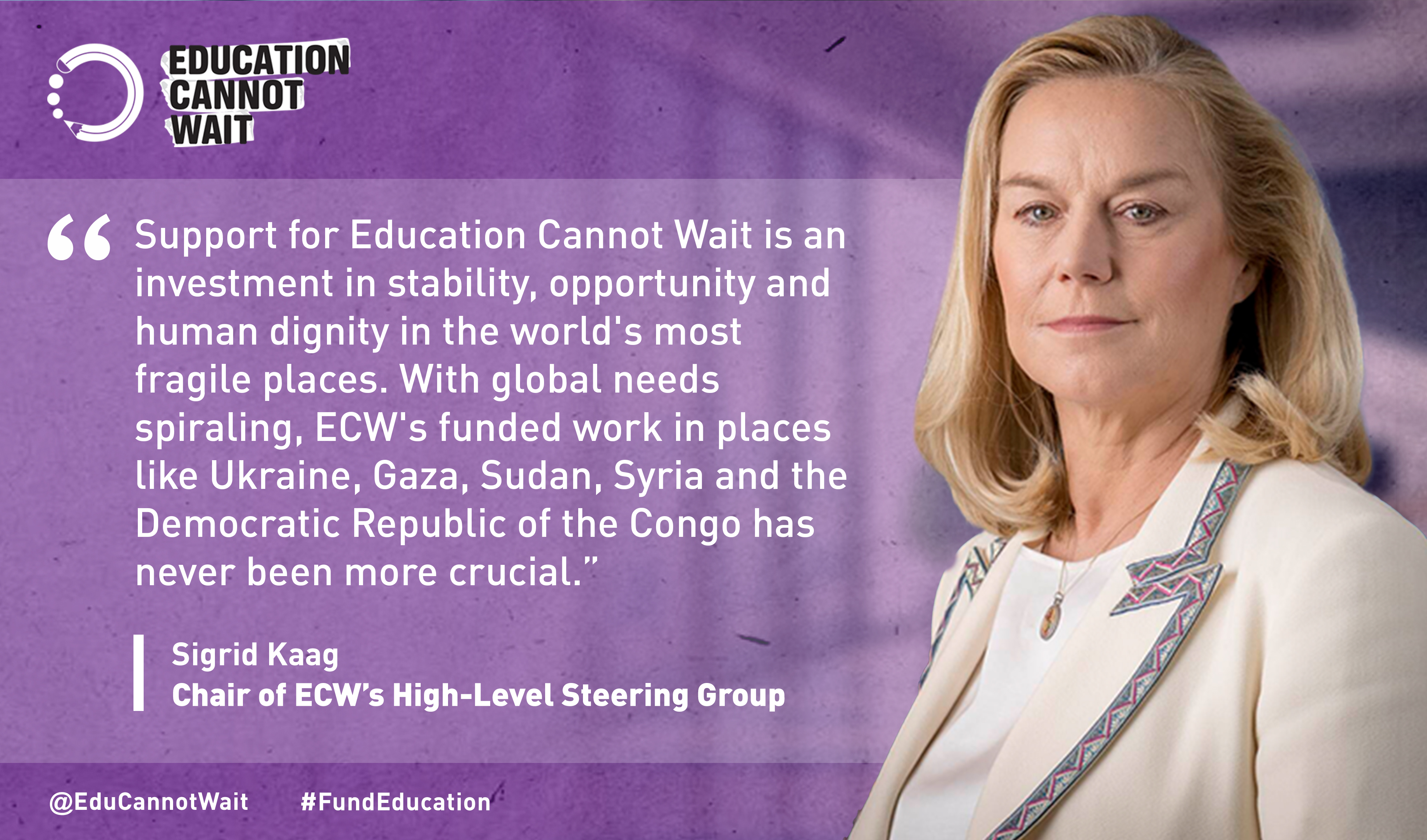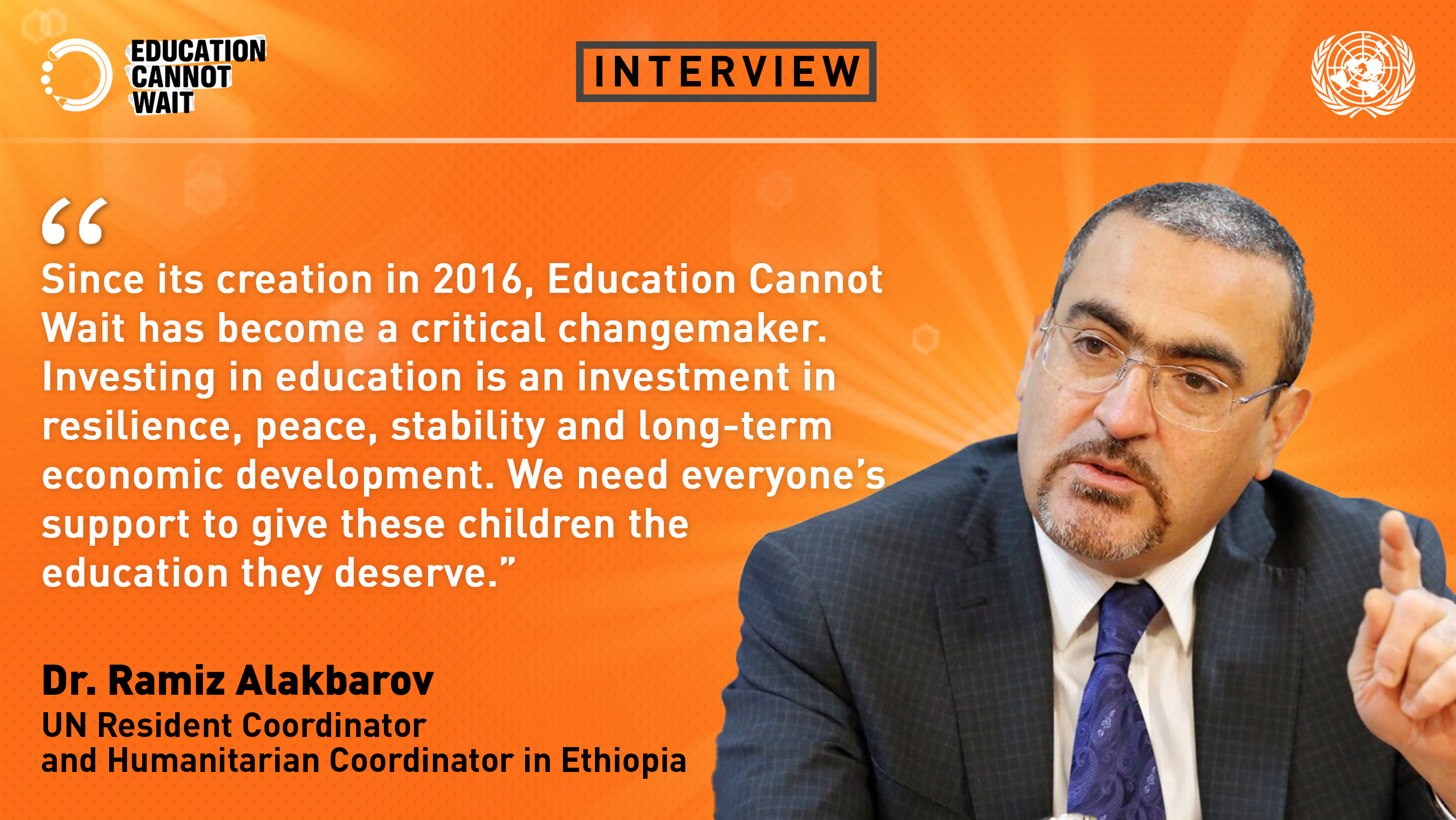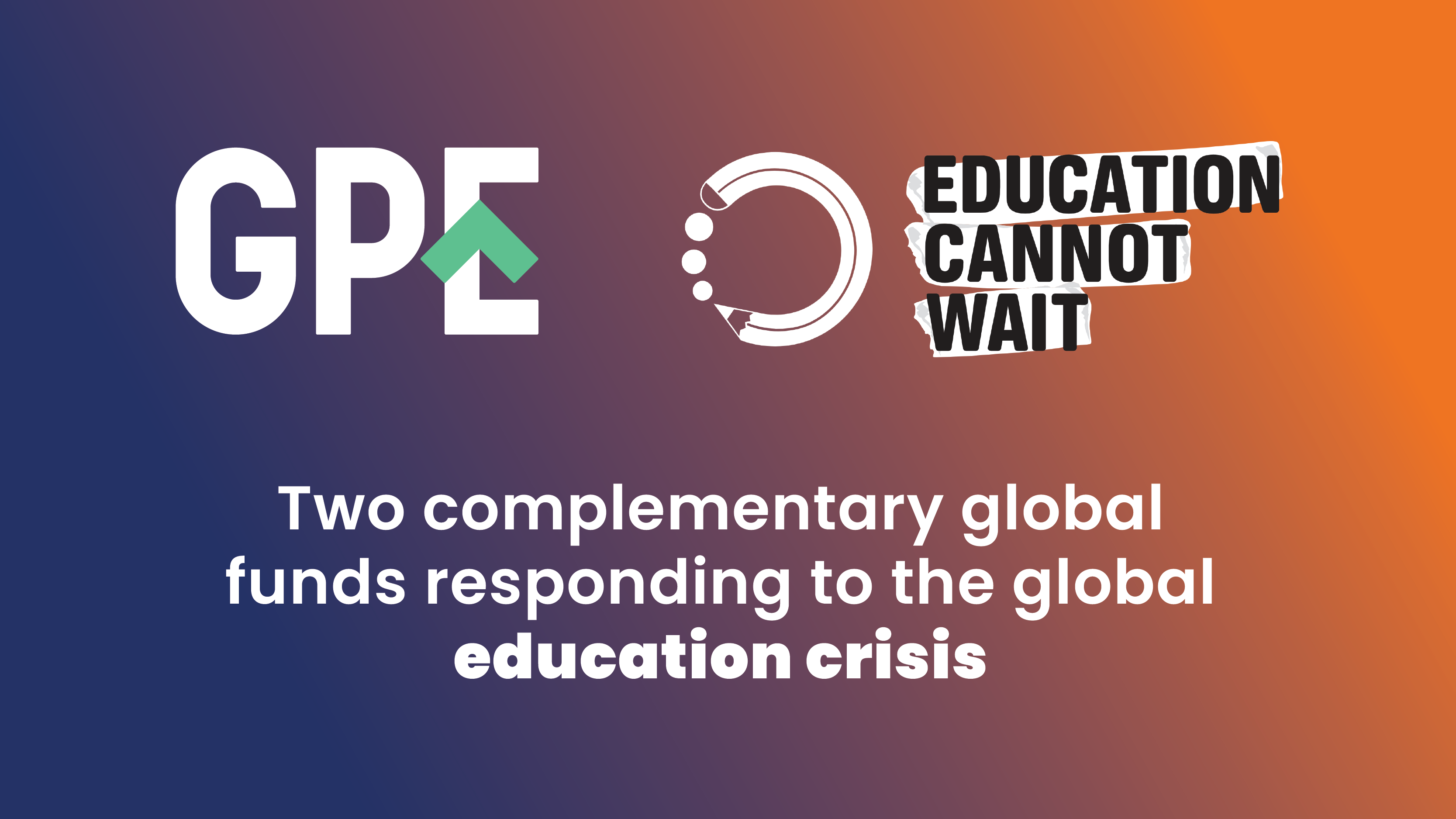ECW Interviews the Honourable Awut Deng Acuil, Minister of General Education and Instruction for South Sudan
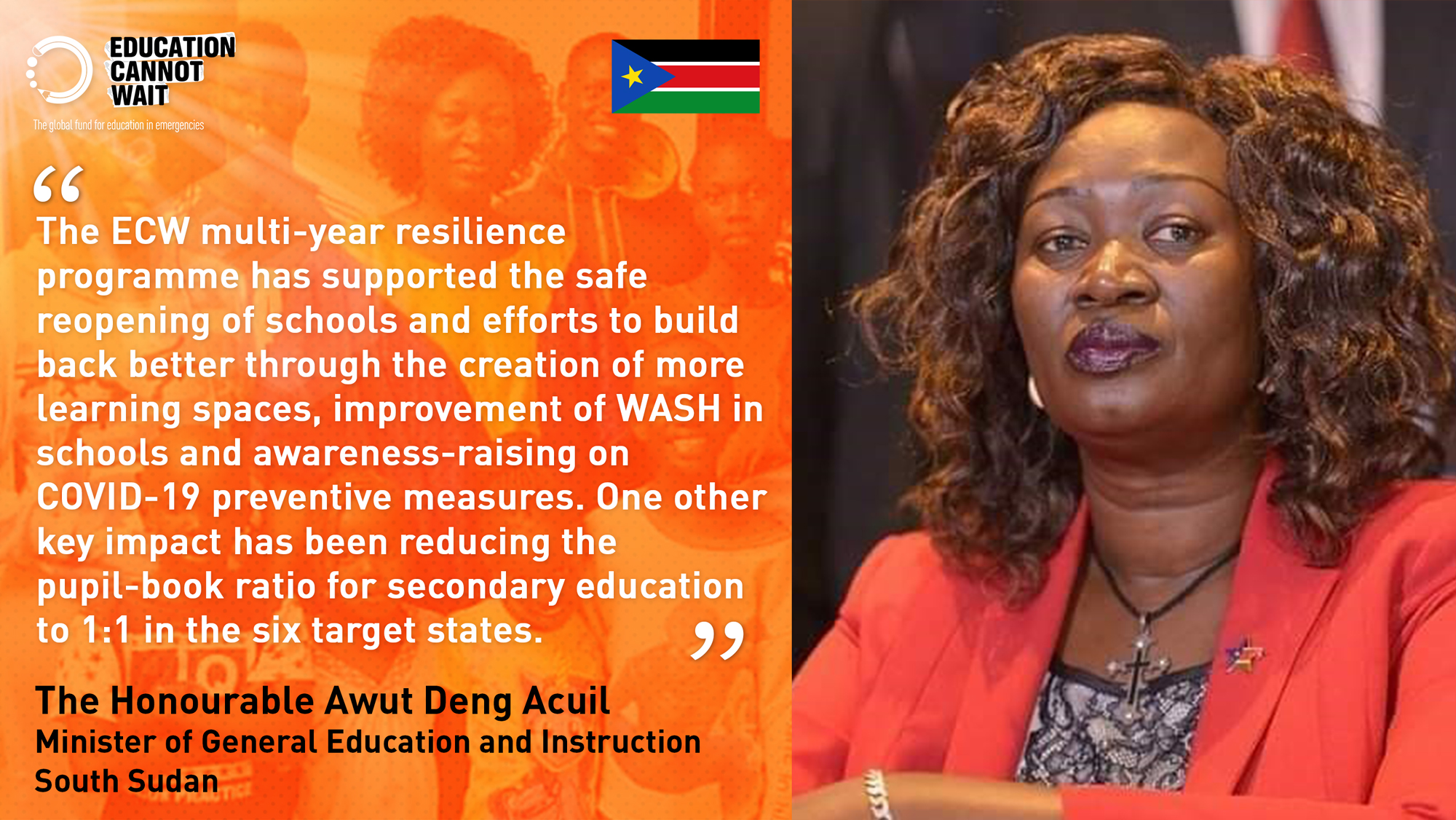
Awut Deng Acuil is the first female Minister of Education for South Sudan, and only the second person to serve as Minister of Education for her country – which became independent country in 2011. Prior to this role, Minister Acuil was the first woman to serve as the country’s Minister of Foreign Affairs and International Cooperation. Recently, Minister Acuil made history as the first women to lead a South Sudan university when she was appointed head of council at the University of Bahr El-Ghazal.
Since 2005, Minister Acuil has served as Presidential Advisor on Gender and Human Rights, Minister of Labour, Public Service and Human Resource Development, Minister of Humanitarian and Disaster Management and Minister of Gender, Child and Social Welfare.
Her long and impressive history of public service began during a challenging time in her life. During the civil war in Sudan, she spent years as a refugee in Kenya with her children. Following the death of her husband, Minister Acuil went on to continue her education and become a fierce advocatefor peace, gender equality and human rights.
Minister Acuil became active in a number of organizations, training others in conflict resolution and advocating for peace. She is a founding member of the Sudanese Women Association of Nairobi and the Sudanese Women Voice for Peace. These experiences, coupled with her degree in political science, led to her participation in eventual peace negotiations between the North and South. She gained international recognition for these efforts to promote peace and development in her war-torn nation when she was awarded the InterAction Humanitarian Award in 2002.
Awut Deng Acuil has been Minister of Education and Instruction for South Sudan since early 2020. The COVID-19 pandemic has had a devastating impact on education globally and further exacerbated existing barriers to education in her country. Not one to balk in the face of challenge, Minister Acuil continues to champion for the rights, protection and education of young and future generations of South Sudan.
As the Minister of General Education and Instruction, Awut Deng Acuil is supporting new initiatives in education, including those with ECW, that aim to open the door to learning for children throughout South Sudan who have been too-often excluded – girls and boys affected by conflict, students with disabilities, and pastoralist children who herd livestock.
ECW: South Sudan has a young population with a median age of 18 years, which results in serious pressure on the education system. Can you describe the challenges faced by South Sudanese children and youth to access inclusive, quality education – especially for girls?
Minister Awut Deng Acuil: A number of inhibiting factors affect school enrolment, retention and completion rates in South Sudan: lack of school infrastructure – including availability of WASH facilities, sex-segregated toilets, menstrual management and sanitation systems, etc. – conflict and insecurity, traditional norms and the high turnover of qualified teachers – particularly female teachers – which results in a lack of qualified teachers. These factors fall into three barrier categories: household and community level barriers; school-based barriers; and, policy/system-level barriers. They can occur simultaneously to limit children’s learning.
While access to education rates are very low for all children in South Sudan, they are even lower for certain groups of children such as girls, children with disabilities, children affected by conflict, and pastoralist children.
Nationally, there are more male students than female students in all school types.
One of the biggest gender gaps is in secondary schools where only 35% of the enrolled students are female.
Children with disabilities face even greater exclusion. 1,597 (1.4%) of children enrolled in ECW’s Multi-Year Resilience Programme (MYRP) supported primary schools are children with disabilities, while 50 (1.38%) learners enrolled in MYRP-supported secondary schools are children with disabilities.
Girls face a number of barriers to accessing education, including:
- Family and community: Among all of the out-of–school children in South Sudan, approximately two-thirds are girls and children with disabilities. Many parents prefer to prioritize boys’ education over girls’ – so, if a family cannot afford to send all of their children to school, the interests of boys‘ education are often favored. This leads to girls either being removed from school for early and forced marriage as they are seen as a source of income or expected to take care of siblings at home.
- School environment: Lack of girl-friendly infrastructure such as WASH facilities, menstrual hygiene management (MHM) issues, school-related gender based violence, gender-biased teaching, learning methods, language, etc.
- System and policy: secondary schools are not available throughout all of South Sudan. The majority are located in urban areas, leaving rural areas neglected. This leads to higher dropout rates in rural areas. Lack of infrastructure, under-qualified teachers, inconsistent teacher pay and scarcity of resources further limit the construction of, access to and continuous staffing of schools.
- Teacher performance at schools: according to Educational Management Information System (EMIS) 2018 data, only 17% of teachers currently teaching in primary schools, and 52% of teachers in secondary schools, have received recognized teacher trainings. Besides the need to train these teachers in education foundations and subject matter content, it is imperative that trainings incorporate gender-sensitive lenses in all aspects – from teaching and learning material to the language used by teachers to promote a gender-sensitive and responsive teaching and learning environment.
Existing Education Cannot Wait (ECW) programmes are addressing learning environment barriers through: the construction of girl and disability-friendly WASH facilities in schools, menstrual hygiene management (MHM), prevention of gender-based violence, etc. More still needs to be done to support the enrolment and retention of girls in school to complete their education cycle and transition to higher levels of learning.
ECW: What are the key priorities and strategies of South Sudan’s Ministry of Education to address these challenges and to fulfil the right to a quality education of every girl and boy in South Sudan?
Minister Awut Deng Acuil: There are two levels of reform that are taking place in South Sudan with respect to the education system.
On a higher, more systemic level, the Government is attempting to prioritize education by creating strategic plans and bolstering the infrastructure required for an effective education sector.
In South Sudan, where 40% of girls are married before the age of 18, the Government has demonstrated its commitment to ending child marriage by prioritizing child protection and providing for gender equality and women’s empowerment in the Constitution, Child Act (2008) and ratifying related international and regional human rights instruments. The right to education is enshrined in the Constitution of the Republic of South Sudan 2011, including in Article 17 on the rights of the child and Article 29 on the right to education.
The General Education Act 2012 outlines a regulatory framework and structure for education in the country, providing guidance on general education principles and goals as well as associated structures, systems, standards, financing and accountability for the sector. The General Education Strategic Plan (GESP) 2017–2022 is a national roadmap for implementation of the General Education Act and outlines strategies, monitoring and evaluation frameworks and financing of the sector. The GESP also includes education in emergencies and humanitarian activities that link to the medium-term development objectives.
The End Child Marriage in South Sudan, Strategic National Action Plan 2017-2030 and a National Gender Strategy, while not yet fully implemented, aim to address the early pregnancy and early marriage issues.
The Inclusive Education Policy in South Sudan was just launched on 27 July 2021. This national policy defines and identifies areas of need across the whole population. The comprehensive inclusive education policy framework will guide the work of all actors involved in the provision of inclusive education to ensure consistency and coordinated implementation. This policy is also important in the elimination of discrimination and enhancement of equity and equality for all learners, especially inclusion of learners with additional needs in the education system, including learners with disabilities.
On a deeper level, reforms have been made to the curriculum and teaching materials, attempting to improve the quality of education and promote peace in South Sudan.
With the help of development agencies and partners, South Sudan has developed a new national curriculum that “is designed to help young people learn about their shared national identity” and “supports key values for the country including justice, democracy, tolerance and respect”. The aims of this curriculum are aligned with the Constitution of South Sudan, the General Education Act and the South Sudan Vision 2040, which aspire “to build an educated and informed nation by 2040.”
Within the curriculum, there are seven goals for the broader education sector; one of the goals is to “promote national unity and cohesion”. While the formation of a national identity can help post-conflict countries overcome differences, nationalism can also be associated with exclusionary policies. How South Sudan moves forward in respecting its citizens’ ethnic diversity, acknowledging its history of conflict and teaching learners to actively engage and think critically will be a key feature of the education system.
ECW: In 2020, together with the Ministry of Education and other education partners, Education Cannot Wait rolled out a Multi-Year Resilience Programme (MYRP) with the particular aim of getting more South Sudanese children enrolled. While these are still early days, how relevant and impactful has the programme been so far?
Minister Awut Deng Acuil: Through the ECW Multi-Year Resilience Programme, 137,708 learners (54,408 girls and 83,300 boys) have been supported to enroll in school in ECD, primary, ALP, PEP and secondary schools across the six States and the back-to-school/learning campaigns are still ongoing to get more children back to school.
Analysis of enrollment trends indicate that many children who were formally in school before the COVID-19 pandemic have yet to return to school. The ECW MYRP has supported the safe reopening of schools and efforts to build back better through the creation of more learning spaces, improvement of WASH in schools and awareness-raising on COVID-19 preventive measures. One other key impact has been reducing the pupil-book ratio for secondary education to 1:1 in the six target States.
ECW’s MYRP is reaching over half of the country geographically, where the majority of the population of children in need are located. The Programme focuses on six States: the three States of the Greater Upper Nile (Jonglei, Upper Nile and Unity States), one State in the Greater Equatoria Region (Eastern Equatoria) and two States in the Greater Bahr el Ghazal Region (Lakes and Warrap). These six States of MYRP implementation are areas affected by different types of conflict and by different trends in terms of displacement.
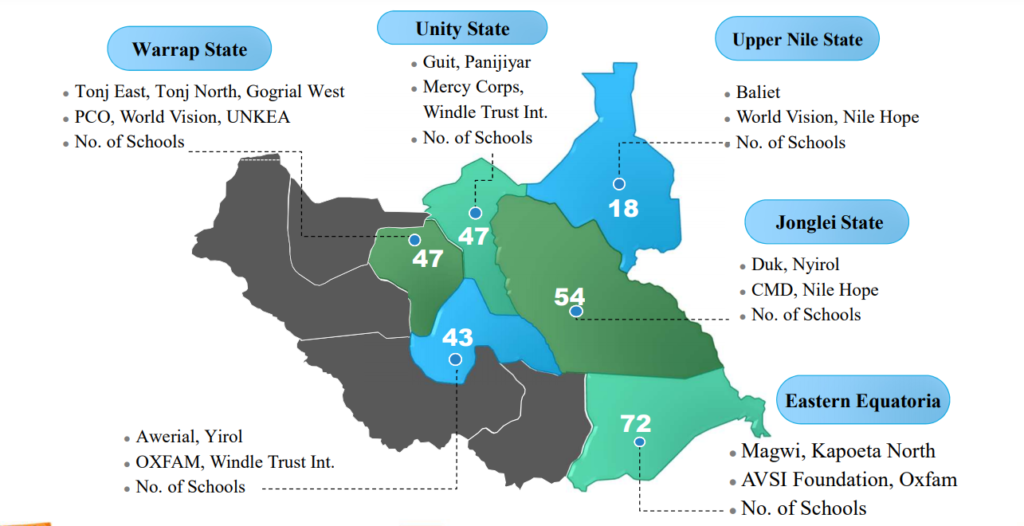
Progress is being made on several components, for example:
- All MYRP target schools/learning centers have received handwashing facilities. Of the 50 boreholes that we committed to drill, so far, 36 have been completed. 6 boreholes have been repaired. Some partners and contractors hired for the work have faced the issue of flooding, so we are considering moving one/two boreholes and funding to other locations that are accessible and eligible. According to the data that we received at the beginning of this initiative, there are 156 schools in need of water sources. Due to budget limitations, we targeted 50 schools. For various reasons, we cannot access some locations and, with the approval of the MYRP Steering Committee, we can begin to consider other locations. During the selection of the 50 schools to receive boreholes, we coordinated with other stakeholders – including UNICEF and DG George Mogga – and used the data generated by GESS.
- 12 million textbooks have reached all targeted counties and, in most cases, reached the schools. Different partners joined the State and County Authorities in distributing textbooks to the schools and we have continuously followed up on the use of the books. The textbooks ratio is expected to be reduced to 1:1 for secondary and primary learners in the targeted six States across South Sudan and other 2 States included in this initiative. All enrolled learners have also been provided with learning kits and adolescent girls have been provided with MHM kits.
- With the exception of children with sight and hearing impairments, all children with physical disabilities have been provided with assistive devices. There is the tendency to focus on the children with visible disabilities and this is something that we must take into greater consideration during the next quarters. We need to make sure that children with “invisible” disabilities also get the support that they need.
- All supported schools have been provided with learning kits including chalk, manila papers, markers and pens.
Additionally, one of the important features of the ECW Multi-Year Resilience Programme in South Sudan is the robust in-country governance mechanism, which is led by the Ministry of Education with active participation of donors like the UK, USAID, SIDA and Canada, United Nations agencies like UNICEF and UNESCO, and civil society actors, like the National Education Coalition. The MYRP Secretariat providing the technical support is an important added value of the programme. This mechanism enhances the Programme’s effectiveness and alignment.
ECW: To reach all the out-of-school girls and boys targeted by this multi-year programme, an additional US$189 million must be urgently mobilised. What is the government’s strategy to ensure that the programme will be fully funded? How can public and private donors help and what message do you have for them?
Minister Awut Deng Acuil: The focus on Internally Displaced People (IDPs), returnee and host community girls and boys aligns perfectly with the Ministry’s target and policy priorities. Multi-year design and catalytic seed funding are innovative approaches as lack of funding too often disrupts South Sudanese children’s continuity of learning.
The MYRP has always been seen as a government intervention, in line with the priorities and objectives identified as national priorities, and the Ministry of Education believes it must make a substantial contribution to its realization.
The Ministry of General Education and Instruction (MoGEI), together with implementing partners, stakeholders, donor groups, etc., has developed a solid fundraising strategy to bridge the significant financing gap, extend the project and include more girls and boys in the Programme.
In the context of South Sudan, the following donor groups have been targeted:
South Sudan Government (domestic resources); public donors (humanitarian and development donors); humanitarian funding envelopes (CERF funding, pooled funding, etc.); other UN pooled funding mechanisms (for example, the Peacebuilding Fund, if relevant); and, private sector donors and private foundations.
By conducting prospect research on potential new donors and existing supporters, MoGEI wants to maximize fundraising reach. And, by analysing these prospects, the Ministry hopes to discover new information that can help create better strategies for all future campaigns too.
ECW: COVID-19 has had a devastating impact on education everywhere. What are the repercussions of the pandemic in South Sudan and how has the Ministry of Education worked to ensure that children and youth are able to keep learning and developing themselves to their full potential?
Minister Awut Deng Acuil: The outbreak of COVID-19 in late 2019 led to the closure of schools in March 2020, when cases of the disease were detected in South Sudan. Numerous deaths and infections were recorded so, as part of precautionary measures, schools were closed and learning was suspended nationwide.
The closure of schools exacerbated the challenges facing education and puts in danger progress made. Data has shown an increase in pregnancies as a result of increased time out of school, which is leading girls to spend more time around men in their communities and at greater risk of sexual violence and exploitation (Save the Children et al., 2015, Children’s Ebola Recovery Assessment in Sierra Leone).
In crises, families may also resort to early marriage as a coping mechanism to either alleviate economic pressures on the household and/or to generate income through ‘bride price’.
Studies have also shown that poverty can drive parents to send their children to cattle camps when they are unable to provide them with food. Child labour in cattle camps is a basis of concern as it means that children are sent far away from home, more exposed to protection issues and inherently prevented from attending school (ILO, 2013, Child labour and Education in Pastoralist Communities in South Sudan).
To reduce negative consequences of school closures and to ensure learners are able to continue their education, MoGEI, with support from different partners, has adapted learning methods and provided alternative protection and support mechanisms. With support from UNESCO, through the Capacity Development for Education Programme, MoGEI launched ‘Education on Air’.
This programme aims to broadcast daily lessons to primary and secondary level learners, focusing on key topics such as English, science and mathematics. During these ‘on air’ lessons, teachers deliver classes and address questions from learners live. Several radio networks have provided such programmes, including City Radio FM, Eye Radio, South Sudan Radio and Miraya Radio. The Ministry of General Education and Instruction, with UNESCO, also introduced ‘Education on Line’, where learners could follow the science teachers while teaching. In October 2020, the MoGEI, with support from development partners, also opened schools for candidate classes all over the country. Necessary steps were taken to avoid putting children, teachers and their family members at risk of contracting the disease.
ECW: The situation in South Sudan has improved somewhat in recent months but the consequences of the multiple shocks and crises that the country has experienced in recent years are still felt. What can be done to further strengthen resilience, and to ensure that the education sector is better able to withstand these shocks and indeed bounce back?
Minister Awut Deng Acuil: Only by planning for unforeseen conflicts and natural disasters, and by integrating disaster risk reduction, can the South Sudanese education system remain functional in the face of shocks.
In this context, South Sudan embarked in September 2015 on its second Education Sector Analysis (ESA). Representing much more than a simple update, the 2015 ESA is the first of its kind to incorporate crisis-sensitive analyses. Multiple education sector analyses, each of which constitutes a chapter of the report (i.e. on the global context, school enrolment and internal efficiency, cost and financing, as well as management and quality), were carried out using a crisis-sensitive lens. Equity analyses were also mainstreamed with a specific focus on gender and the regional state-level, reflecting the decentralized nature of the education sector. These permit a better understanding of education sector challenges, weaknesses and strengths.
ECW: Our readers would like to get to know you a bit better on a personal level and reading is a key component of education. Could you please share with us a book that has influenced you the most personally and/or professionally, and why you’d recommend it to other people to read?
Minister Awut Deng Acuil: When I was a child, I loved Alice in Wonderland very much. Alice diverges from the gender norms by creating a completely new world that she explores while facing many hostilities with a very positive attitude. Alice is a prototype of a rebellious child who manages not only to survive this dangerous adventure but also to learn and become a woman with a new sense of her own subjectivity. A woman who refuses ideas of marriage and oppression and instead teaches us that “we can chase something interesting, barge in where we’re not invited, try new things, observe strange phenomena, ask too many questions, argue with authority figures, tell stories, and wander far from home without worrying how to get back.”

